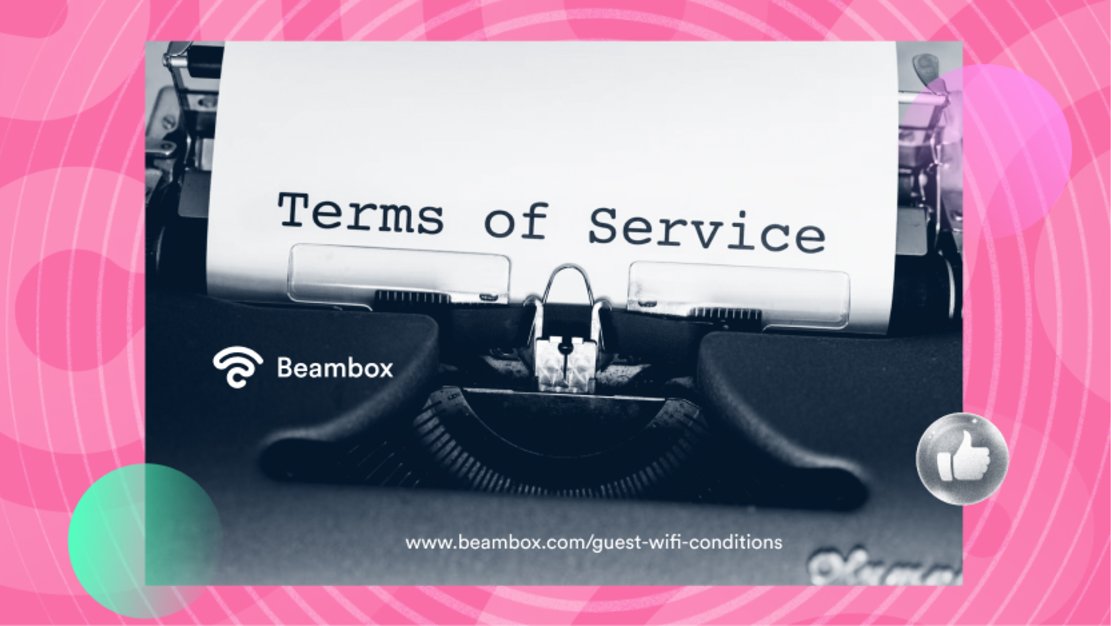
Public WiFi guest terms and conditions are essentially a contract between a wireless internet service provider and a customer. As a customer, you may notice these terms and conditions when you visit a cafe, for example, and log onto their WiFi network. Or, if you’re a small business owner thinking of offering guest WiFi, you may notice that many service providers encourage you to add terms and conditions.
So, what exactly are WiFi terms and conditions, and why do they matter? We’re covering all that in this article. Keep reading to learn how to use internet T&Cs to your advantage, common considerations, and examples to create your own.

If you offer WiFi in your venue, writing a legally sound guest wireless terms and conditions policy is a must. It’s important that your guest terms and conditions policy comply with all applicable laws in your jurisdiction.
Finding the correct information online can be challenging. Especially if you want to approach the activity independently. Knowing what to include can become slightly confusing and overwhelming. Not all businesses will need to include the exact same information. Even though the majority of WiFi network policies will have some similarities.
Writing an effective and compliant WiFi terms and conditions policy requires you to research the mandatory requirements for your jurisdiction. Finding such information should be straightforward because the regulatory bodies of each country need to provide clear guidelines for businesses.
In this article, we’ll take you through what you need to know before writing your WiFi terms and conditions policy. You will learn why comprehensive WiFi terms and conditions matter to your customers and also to you as a business. We will take you through what your terms and conditions policy should include and how to write them effectively. So, let’s begin.

The specific content of WiFi terms and conditions varies depending on the use of the service. It also depends on jurisdiction and the type of business you have. The key elements, most of the time, are the same:
It is fundamental to show users your WiFi terms and conditions to ensure you protect your business from malicious internet use. Using a social WiFi hotspot will make it easier to show it to any customer connecting to your network.
It is always a good idea to research what regulations exist in your jurisdiction. Reading a reliable customer wifi terms and conditions example (e.g., Starbucks, McDonald’s, etc.) can be useful. We also recommend consulting local laws and checking with legal counsel like a lawyer or attorney. This can provide additional information and peace of mind.

Writing your wireless network terms and conditions may seem daunting at first. However, you can save money and spare yourself future trouble by using available resources to write them yourself.
Here is a list of 5 steps to begin writing the WiFi terms and conditions for your business:
It’s always advisable to ask a legal expert to review what you’ve written. This will ensure that your WiFi terms and conditions comply with existing laws in your country.
Users of our guest WiFi must comply with our terms and conditions and acceptable use policy. We do not allow users to engage in alleged illegal activity or criminal activity through our WiFi. Prohibited activities include hacking, spamming, watching illegal content, and causing internet viruses. Such service use may result in law enforcement authorities’ involvement. We also prohibit unauthorized third parties from accessing our services.
We reserve the right to collect certain information from users of our guest WiFi, including device information and browsing history. (Here, you should list any data you aim to collect. For example, the MAC address of your guests’ devices, email address, first and last name, and I.P address ). By using our guest WiFi, users agree to our privacy policy.
You must not use the service to access computers or electronic devices belonging to another party illegally or without authorization. This includes attempted system penetration or attempting to penetrate the security measures of another system.
You must not use the service to access Internet services that contain abusive language or material. This includes offensive or derogatory images. Such use of the network will require us to report directly to law enforcement authorities. Any malicious or legal activity undertaken while using the WiFi network and begin the legal process.
You must not use the service to distribute Internet viruses or other destructive software or unauthorized third parties. Including the distribution of other harmful code via the company’s WiFi.
We are not responsible for damage caused by any virus or other harmful application arising out of breach or failure of express or implied warranty, negligence, or strict liability in tort or otherwise. (This is important because public WiFi poses risks, and you don’t want to respond for inappropriate use.)
The Company reserves the right and can, at any point, block access immediately to the guest WiFi network. This will be a consequence should you not comply with our terms. The company does not have to provide any prior notice.
Whilst using our service, we’ll keep a log of the Internet Protocol addresses of any devices that access the Service. Including the times when they accessed the Service and the activity associated with that IP address. I confirm that I accept these terms and conditions based on my use of the wireless internet access provided. This Agreement constitutes the complete and entire statement of all terms.

Having clear and comprehensive WiFi terms and conditions is vital for any business that offers free WiFi to its customers. Such information is a legal requirement and will spare you unnecessary legal troubles or user issues. While writing WiFi terms and conditions can be tricky, it is doable.
Moreover, you can define what your users can or can’t do. This will protect your business and give you peace of mind.
After you’ve finished writing your guest WiFi terms and conditions, you should start to collect data to grow your business. With this data, you can run marketing initiatives targeting specific groups of guests. The best way to do this is by using a WiFi marketing solution like Beambox.
Beambox will allow you to collect data, provide safe WiFi, improve your online reputation and more, all under one easy-to-use platform.
WiFi marketing is an innovative type of marketing that leverages the free WiFi you offer to your customers. Beambox is a cost-effective WiFi marketing solution that can help you collect data AND gather insights about your everyday customers.
You can use those insights to run marketing campaigns attracting customers. This will, in turn, increase ROI. You can also segment user data within the Beambox platform to look at how different guests interact within your business.
Grow your ratings on review sites, build an audience on social media sites and secure your network, all with Beambox. Beambox integrates with most internet systems and does not require you to purchase any hardware. Start your 30-day free trial now.
Beambox helps businesses like yours grow with data capture, marketing automation and reputation management.